Navigating to Zero - August 29, 2023
08/30/23
AWO’s Safety Leadership Advisory Panel was proud to present two days of learning opportunities and networking during the 2023 Summer Safety Committees’ Meeting in St. Louis August 16-17. Topics ranged from integrating alternative fuels into fleets, to human behavior and company culture. Below we’ve highlighted just a few of the sessions covered in the meeting. For access to presentation slides and video recordings from the meeting, members can visit AWO’s Resources webpage.
Caterpillar: Sustainability Solutions for Marine Segments
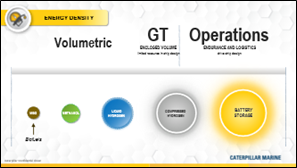 |
Gary Sarrat, Jr., Caterpillar Marine Key Account Manager for the Inland & Tug Segment, discussed Caterpillar’s work to design less carbon-intensive engines. His presentation featured a comparison of the operational and design considerations of a range of alternative fuels like biodiesel, methanol, liquified and compressed hydrogen, and battery storage, and underscored that hybrid vessels and a mix of fuels are likely to play a key role in the maritime industry’s path toward reducing its carbon footprint.
SafeMTS: Confidential Near Miss Reporting Mechanism for Maritime
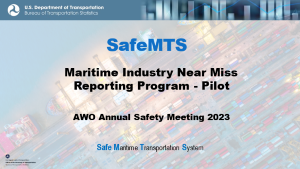 |
Kevin Kohlmann, Director of Safety at the Maritime Administration (MARAD), and Barry Ramesar, Director of Operations Integrity at Crowley, presented on the SafeMTS pilot program. SafeMTS is a voluntary, confidential near miss reporting program for the maritime industry developed in partnership between MARAD and the Bureau of Transportation Statistics (BTS) to help industry identify safety trends and drive continuous improvement. Mr. Kohlmann described the data protections put in place by BTS and shared the timeline for full program implementation, and Mr. Ramesar provided a vessel operator’s perspective on the importance of a robust, standardized near miss collection program.
Leadership Insights from VADM Dean Lee
Vice Admiral Dean Lee (USCG, ret.) shared insights gained during his impressive career spanning more than three decades in the Coast Guard, including as Commander of the Atlantic Area. VADM Lee delivered inspiring advice on servant leadership, highlighting through personal stories the importance of humility, openness to feedback and criticism, and the organization of priorities for operational success. VADM Lee also talked about how these values can support the full range of decision-making, from high-pressure emergency responses to the more mundane responsibilities that all leaders must balance in their organization.
Heat Alert: OSHA National Focus Area
Extreme heat poses a severe risk to workers, especially during the ongoing intense heatwave across many states. This summer is on track to be the hottest on record in the U.S., and mariners are especially susceptible to heat-related illnesses if not adequately protected and trained.
Thousands of workers fall sick due to occupational heat exposure each year, with new employees at the greatest risk. Alarmingly, nearly three out of four workers who die from heat-related causes do so within their first week on the job.
We have an obligation to safeguard mariners from heat-related hazards. We can do this by providing protections such as cool water, rest breaks, shaded rest areas, and gradual acclimatization for new or returning employees. Additionally, ensuring our mariners are trained in heat illness prevention, recognizing symptoms, and responding promptly to signs of distress is an important component of successful heat illness prevention programs.
The Occupational Safety and Health Administration (OSHA) is actively focusing on mitigating heat-related hazards, implementing enhanced enforcement in vulnerable areas and industries. While OSHA does not have oversight of mariners on inspected vessels, the agency’s recommendations may be used by the Coast Guard in marine safety information bulletins and alerts, and OSHA provides a number of resources that safety managers can use to support their heat illness prevention programs.
More information and source material for this article can be found at:
Seamen’s Church Institute Presents SafeTALK: Suicide Prevention Training
Suicide is one of the most significant public health issues facing the world today, and each person’s reasons for thinking about suicide are as complex and varied as the individuals themselves. To address this, Seamen’s Church Institute (SCI) is offering a program called SafeTALK.
The SafeTALK workshop is designed to teach vessel officers how to prevent suicide by helping them to recognize the signs, giving them tools to have an initial conversation with an at-risk crew member, and educating them about how and when to connect a crew member in need with an intervention resource for further support.
For more information, or to set up a class in your area, please reach out to SCI Chaplain David Shirk at dshirk@seamenschuch.org or (270) 210-5626.
AWO Now Accepting Nominations for Tankering & Barge Operations Subcommittee Safety Award
|
AWO’s Tankering & Barge Operations Subcommittee is dedicated to improving the safety of barge tankering operations through targeted initiatives that are identified by industry and informed by collaboration with stakeholders. It has been instrumental in raising awareness of best practices and advocating for innovative solutions to improve workplace safety for tankermen.
|
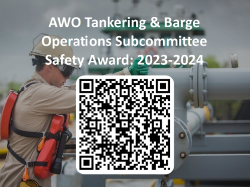
The Subcommittee is excited to announce it is now accepting nominations for its 2023-2024 Safety Award. AWO encourages all industry stakeholders to nominate individuals, organizations, companies, or facilities that have improved equipment, personnel, and/or processes to enhance safety of those involved in cargo transfer operations. All nominations should include a description of the specific improvement made and details about how it enhances tankerman safety. Examples of improvement areas include, but are not limited to:
|
Mooring
|
Vessel to shore communications
|
|
Access/egress
|
Flow rate controls
|
|
Fall overboard & slip/trip/fall prevention
|
Line clearing operations
|
|
Transfer equipment handling
|
Exceptional safety contributions
|
U.S. Coast Guard - AWO Annual Safety Report Published
For almost 30 years, the Coast Guard-AWO Safety Partnership’s National Quality Steering Committee has been tracking overall trends in towing industry safety and environmental protection, which it conveys in an annual report. This year’s report, compiled by the Coast Guard Office of Investigations and Casualty Analysis, included the following notable findings:
- The 2022 crewmember fatality rate per 100,000 full-time employees (FTE) was the second-lowest ever recorded by the Partnership;
- Four towing vessel crewmembers died in incidents related to towing vessel operations in 2022. Two of the fatalities were attributable to a fall into water, one was the result of being struck by a line, and one was due to being struck by a suspended load during crane operations; and
- For the second year running, the Partnership recorded the lowest tank barge oil spill volume since 2010 and the second-lowest ever: 3,109 gallons. The tank barge spill rate for 2022 is only 0.05 gallons of oil, or less than one cup, per million gallons transported.
The report also presents towing vessel casualties and towing vessel crewmember injuries by number and severity.
Quick Safety Tip:
BOOT check! We are three months into one of the hottest summers on record. If your crew is using the same boots that they wore in the spring, there is a good chance some of the soles have worn down faster than in more temperate times. Check your crew’s boots for:
- Torn leather or rubber that exposes the foot;
- Missing laces or straps; and
- Worn soles: Boots must be discarded or re-soled when soles are worn out and become a slip hazard.
AWO High Potential Learning Value Near Miss
Near Miss and Stop Work events are leading indicators that provide operators with an opportunity to identify and address weaknesses in a safety management system before a hazardous condition or lack of procedure contributes to an injury or incident.
We are highlighting recent High Potential Learning Value Near Misses submitted voluntarily by AWO members. To submit your own Near Miss or Stop Work event, please use this form.
Improper Use of Rigging – Strap Selection
MEMBER-SUBMITTED NEAR MISS 23-05
A barge was alongside a ship conducting a bunkering operation when the PIC noticed that a small, undersized strap with a rigged shackle was being used to secure the barge stern line to the ship. The undersized strap was designed to be used to lift a 3” MGO hose, thousands of pounds less than the rating of rigging that should be used to moor the barge. The PIC replaced the undersized strap with a larger heavy-duty strap designed for mooring applications that was available on the barge.
The terminal and barge operators discussed the near miss, and the event will be discussed during the operator’s upcoming safety meeting.
|
POSSIBLE IMPACTS OF THIS EVENT COULD HAVE INCLUDED:
|
|
|
LESSONS LEARNED & FUTURE RISK MITIGATION:
|
|
Cement Terminal Failed to Protect Worker Who Fell Overboard and Drowned: Department of Labor Decision
The U.S. Department of Labor's Occupational Safety and Health Administration (OSHA) found that three workers from Buzzi Unicem, USA, also known as River Cement Sales Co., got on a barge without wearing personal protective equipment, including life jackets. One of these workers fell into the river head-first from the barge's side while trying to fix a valve on the second level. Coworkers tried to help, but couldn't save the worker. It took almost a month to find the worker's body. OSHA issued two citations for failure to ensure employees wore personal flotation devices when exposed to drowning hazards and failure to provide guardrails on the docked barge, leaving the waterside edge exposed. Additionally, OSHA discovered three other violations and has proposed fines totaling $62,500.
Occupational Safety & Health Review Commission Home Page: https://www.oshrc.gov/decisions/
U.S. Aviation Industry Reporting More Near Misses
The New York Times published an article this month on the safety of the U.S. air travel system, discussing a recent increase in near misses in the U.S. aviation network, noting that the number of reports captured by the industry’s voluntary near miss reporting system has doubled over the last decade. There is debate over whether the increase is due to declining safety conditions or better reporting. The article discusses understaffing challenges at air traffic control facilities, which have led to mandatory overtime for some air traffic controllers and reports of distracted and fatigued veterans who now have the added responsibility of training new employees.
|
Swiss cheese model by James Reason published in 2000(1). Depicted here is a more fully-labelled black and white version published by NIOSH.
|
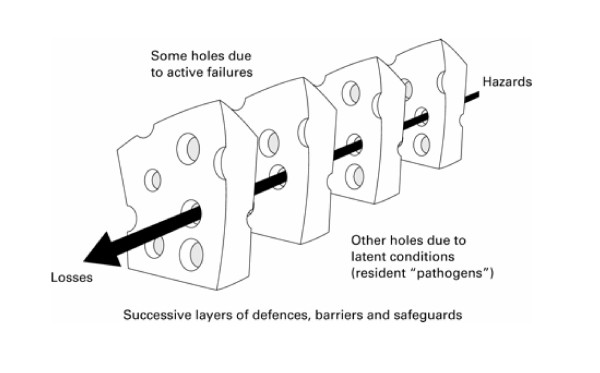 |
Near miss reporting is part of an aviation industry risk model that is also familiar to the maritime industry: the ‘Swiss cheese’ model, which relies on layered controls to prevent any single failure or weakness in an operation leading directly to an incident. Regardless of the reason for the increase in reports, the fact that near misses, not incidents, are the topic of discussion underscores the value of a robust, widely utilized near miss reporting system that allows the industry to learn from leading indicators, rather than lagging indicators like crashes.
NOAA Forecasters Increase Atlantic Hurricane Season Prediction to ‘Above Normal’
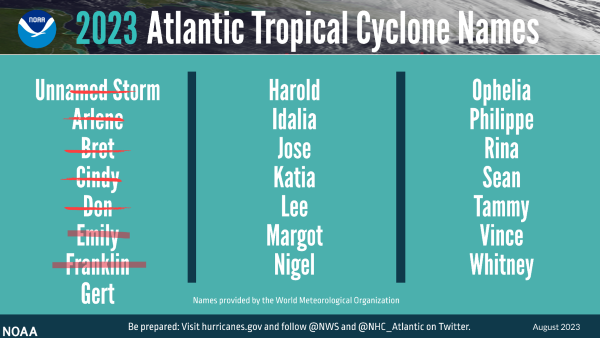 |
NOAA scientists have raised their prediction for the 2023 Atlantic hurricane season from near-normal to above-normal due to warm sea surface temperatures offsetting El Niño effects. The likelihood of an above-normal season is now 60%, up from 30% in May, with near-normal activity chances reduced to 25% from 40%, and a 15% chance of below-normal activity. The updated outlook expects 14-21 named storms, 6-11 hurricanes, and 2-5 major hurricanes with 70% confidence, including storms already formed. El Niño’s typically suppressing effects have been slow, possibly allowing more tropical activity. Other factors shaping the forecast include wind shear and trade winds.
For more information and tools for tracking storms, visit NOAA’s National Hurricane Center: https://www.nhc.noaa.gov/.
NTSB: Automatic Shutdown of Main Engine on Cargo Vessel Led to Collision
The National Transportation Safety Board (NTSB) has published a Marine Investigation Report detailing the circumstances of a collision between two cargo ships in the Houston Ship Channel, caused by the automatic shutdown of a main engine on one of the vessels.
The vessel was equipped with a single 8,180-hp diesel engine, and included an oil mist detector (OMD), designed to shut down the engine immediately when the OMD sensed an increase of oil mist in the crank case so as to prevent explosions.
|
Casualty type
|
Collision
|
|
Location
|
Sabine Pass, Port Arthur, Texas
|
|
Date
|
August 21, 2022
|
|
Time
|
1045 Central Standard Time
|
|
Injuries
|
None
|
|
Property damage
|
$3.4 million est.
|
|
Environmental damage
|
None
|
The manufacturer issued a safety warning that the OMD alarm may be triggered by water vapor in the engine and recommended additional steps be taken when performing maintenance in humid conditions, which were present in this incident. The night before the collision, with humidity reported at approximately 85%, the crew had swapped a head gasket and performed an oil change. The humidity was approximately 72% at the time of the incident. The crew did not have a procedure that addressed the manufacturer’s safety warning and recommendations.
Lessons Learned:
- From the NTSB: After an engine’s crankcase is opened and exposed to ambient air conditions during maintenance and repair, it is good practice for engine crews to inspect and test the lubricating oil system for water intrusion and ensure lube oil purifying equipment is functioning properly to remove any water or other contamination in the lube oil.
- From AWO: As our industry considers the impacts of adding engine system components such as diesel particulate filters and other after-treatment technology, there is a risk that these additions will include sensors capable of shutting down engines. Whenever components that have the ability to shut down an engine are installed, vessel maintenance and management should perform a thorough management of change analysis to consider the risks and best practices applicable. Procedures should be instituted as needed to address risk and management should ensure the procedures are effective and performed on schedule.
We Can Be HEROes
The American Waterways Honor & Excellence in Rescue Operations (HERO) Award recognizes rescues undertaken by AWO member company employees that demonstrate selflessness, skill, and bravery. AWO launched the program on March 1, recognizing our first awardees during the Safety Committees’ Winter Meeting. At the Safety Committees’ Summer Meeting on August 17, AWO recognized 20 vessels and facilities that had received the award since the Winter Meeting. It is an honor for AWO to recognize mariners for the great things they are doing every day to protect themselves, their crews, the environment, and the communities in which they operate.

|
AWO is excited to announce that the award package has grown! American Waterways HERO awardees now receive a custom-minted American Waterways HERO challenge coin, a certificate recognizing their vessel or facility, and, thanks to sponsors 360 Coverage Pros and Berkley Offshore, a complimentary one-year Marine License & Professional Liability Insurance policy.
|
Details about how to submit a nomination for the American Waterways HERO Award and the submission form can be found on the AWO website. Please help us thank and shine a spotlight on our industry’s heroic mariners by sending in a nomination!
Congratulations to these recent recipients of the American Waterways HERO Award!
|
Company
|
Vessel
|
Date of Event
|
|
Turn Services LLC
|
Omaha
|
1/17/2023
|
|
Middle River Marine, LLC.
|
Elyse Noelle / Lemont Terminal
|
8/2/2023
|
Subcommittee News
Tankering and Barge Operations Subcommittee
The Tankering and Barge Operations Subcommittee met at the Safety Committees’ Summer Meeting to discuss priorities for the year ahead. The group committed to continue to work on a user-friendly form to collect near misses at terminals, discussed recent vapor-lock valve issues attributed to high heat, and launched the nomination process for the Subcommittee’s 2023-2024 Safety Award.
This Subcommittee’s mission is to identify general and specialized safety issues affecting tankermen and explore and develop appropriate industry-initiated solutions to the identified issues to improve the safety of tankering and barge operations. If you would like to participate in this subcommittee, please email safety@americanwaterways.com.
Falls Overboard Subcommittee
AWO’s Falls Overboard Subcommittee is made up of carrier and affiliate members with an interest in developing real-world solutions to address falls overboard, the leading cause of fatalities in the barge and towing industry.
The Subcommittee met virtually on April 24 to review its draft report on the prevention of falls overboard and discuss standards, policies, tools, and equipment that may be used to mitigate the risk of falls from an unguarded edge of a barge. If you would like to participate in this subcommittee, please email safety@americanwaterways.com.
Distracted Operations Subcommittee
The Distracted Operations Subcommittee is working to identify sources of distraction and develop tools to mitigate the risk of distractions as a contributing factor in marine casualties. Through the Subcommittee’s work, AWO has published a Sterile Wheelhouse Guide and a Deckhand Distracted Operations Guide. If you would like to participate in this subcommittee, please email safety@americanwaterways.com.
Environmental Stewardship Working Group
AWO is working with members of the Environmental Stewardship Working Group to develop and publish an updated version of our Voluntary Environmental Stewardship Best Practices.
The diverse operational profiles of AWO’s members mean that there is no one-size-fits-all solution for companies looking to reduce their impact on the environment. The Voluntary Environmental Stewardship Best Practices do not create rigid rules; rather, they detail potential practices in a catalog that can serve as a resource for members seeking to take the next steps on their sustainability journey.
If you would like to be a part of the working group, please contact Leah Harnish.
SSRP – We Need Your Input!
The value of AWO’s Safety Statistics Reporting Program depends on the full participation of all eligible members. This includes carrier members who employ or are responsible for vessel crews in their operations. Please visit the Safety Statistics Reporting Program website and enter your data for the second quarter of 2023, as well as any historical data that may be missing. Your submission is confidential and crucial to our industry’s benchmarking, advocacy, and safety and sustainability initiatives. If you have any questions, please feel free to contact mbreslin@americanwaterways.com.
|
A Recipe for a Healthier You
Garlic Parmesan Chicken
Looking for something low-carb? Pair this dish with mashed cauliflower potatoes or zucchini noodles. Adapted from Keto Karma.
|
|
|
PREP TIME
|
TOTAL TIME
|
SERVINGS
|
|
5 min
|
30 min
|
4
|
Ingredients
|
4 boneless, skinless chicken thighs
|
4 cloves of garlic, minced
|
|
½ teaspoon salt
|
¼ cup grated parmesan cheese
|
|
¼ teaspoon black pepper
|
¼ teaspoon red pepper flakes
|
|
¼ cup butter, separated
|
3 tablespoons chopped fresh basil
|
Directions
- Season the chicken thighs with salt and pepper.
- Melt 2 tablespoons of butter in a skillet over high heat. When very hot, place chicken thighs in the pan.
- Brown the chicken on one side for 5-6 minutes, then flip the thighs and turn the heat down to medium. Cook the chicken for another 8-10 minutes, until the internal temperature reaches 165 degrees.
- When cooked through, remove the chicken to a plate.
- Turn the heat to low and add the remaining butter, garlic, red pepper flakes and basil to the skillet. Stir until the butter melts and garlic is fragrant.
- Return the chicken to the skillet and sprinkle 1 tablespoon of parmesan cheese on each thigh. Spoon the sauce on top and serve.
Nutrition (per serving = 1 chicken thigh)
|
Calories: 308kcal
|
Fat: 20g
|
|
|
Carbohydrates: 2g
|
Fiber: 1g
|
Protein: 32g
|
Health Tips
- Chicken thighs are a great source of protein. They also contain more iron than chicken breasts.
AWO is invested in the wellness of our maritime family. Caitlin Kidd, AWO’s Manager - Membership & Digital Operations, is also a nutrition expert. She holds a Bachelor of Science degree in dietetics from the University of Northern Colorado and is passionate about helping others develop healthy habits through sharing the positive impact of good nutrition and making quality dietary choices. Do you have a recipe or an idea for a healthy meal? Share it with Caitlin by sending it to safety@americanwaterways.com – you could be included in a future newsletter!
